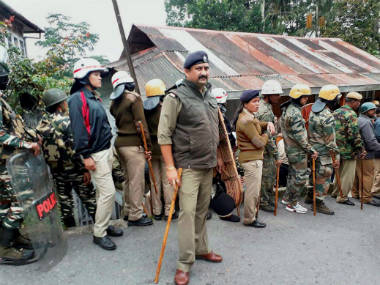Popular perception is that the region’s penchant for music could well be inspired by its natural surroundings. But when the soundtrack in the Darjeeling hills is animated by a singing contest projected in the public arena, it has had the potential to affect domains far beyond the stage or studio, both in space and time. Eleven years ago, Indian Idol, the nationwide singing reality show, had ushered in a new political dispensation in the hills, riding on the wave of a ground-swell of support for the Nepali/Gorkha crooner who had come up trumps in the contest. Today, a mega event drawing thousands of participants across the region is designed to shore up legitimacy for the current status quo. Organised by the local police as part of a confidence-building and public relation venture, the event comes on the back of a seismic shift in the political landscape, which followed a record June-September 104-day-long lockdown in Darjeeling in support of the demand for a new Gorkhaland state last year. [caption id=“attachment_3733529” align=“alignleft” width=“380”] File image of Darjeeling Police. PTI[/caption] Back in 2007, it was Prashant Tamang, who hails from the hills, who had triumphed, propelled by a mass mobilisation campaign largely on ethnic lines and navigated by leaders who used it as a springboard to power. Today, the police-sponsored mega talent quest encompassing the hills, the likes of which has not been seen in recent memory, has all but run its four-month-long course. Winners of “
Darjeeling Rising Stars” will be selected and prizes awarded at the finale scheduled in the hill town this weekend. However, the jury is expected to be out for a while on whether the organisers have been successful in what they had set out to achieve through the event — to salvage the confidence of a public, a considerable section of which was at the wrong end of a robust crackdown on supporters of the
statehood campaign during and in the aftermath of the protracted shutdown in the hills. Also to be seen is how far the event has, in any way, been able to facilitate the return to the mainstream of the youth who had formed a substantial section of the vanguard of the movement, as the police administration hopes. Given its nationwide reach, Indian Idol unsurprisingly towers over any regional public singing competition. But that can, in no way, diminish the significance of the ongoing event in the Darjeeling hills, designed not merely to hunt and reward musical talent but also to serve a wider social purpose, considering the region’s rather turbulent political recent history. Much water has flown down the springs crisscrossing the hills since a fresh set of leaders of a new political formation — the Gorkha Janmukti Morcha (GJM) — were catapulted into power after the 2007 Indian Idol contest. The very dynamics in local politics has since changed, and the rhetoric surrounding the statehood demand seems — at least for now — no longer part of the script. GJM leader Bimal Gurung has been exiled to the margins, but his one-time associate, Benoy Tamang, the chairman of the board of administrators of the Gorkhaland Territorial Administration, remains firmly strapped in the saddle, albeit with the support of the West Bengal government. The set-up he now presides over would be the ultimate winner if the singing, dance and music competition restores public confidence in the police after last year’s unrest, which shook the local political arrangement. Suffice it to note that it was this very police that had booked Gurung, who continues to be on the run, for a raft of charges, including under the Unlawful Activities (Prevention) Act in connection with the violence in Darjeeling during last year’s statehood stir. In March, the Supreme Court
dismissed his pleas seeking immunity from arrest . However, he has remained elusive all these months, believed to be holed up in Nepal for much of the time. This has led to questions on whether the administration is particularly keen on nabbing him, even though he had been served a lookout notice last September. Local circles are questioning whether his arrest would make Gurung a martyr for the cause of a new state, or should he be left to fester in his own juices, now that he has been banished from the region and is no longer a threat to the powers that be. Earlier this month,
Tamang had upped the ante at a GJM rally at Kurseong in Darjeeling district, where he asked why Gurung was scared of facing the legal process and going to jail. “Do you think you can lead a movement by remaining underground?” he had reportedly said. Although out of sight, Gurung realises the need to send out the occasional audio from his hideout, in which he reiterates his commitment to the statehood cause, well aware that it is imperative that he make at least the odd verbal contact if he is to hold onto what is now being accepted as his rapidly shrinking base constituency. And all this while Tamang prepares to consolidate his hold on the GJM, which continues to remain the principal political force in the region even though it might have torn itself apart into two camps. What is significant though is that the division within it seems to have set the stage for a proxy political tussle between the ruling party in the Centre and that in the state — one that could well go a long way in affecting the political future of the hills.
The local police organised ‘Darjeeling Rising Stars’ as part of a venture to rebuild people’s confidence in the force after the Gorkhaland protests last year.
Advertisement
End of Article


)

)
)
)
)
)
)
)
)



